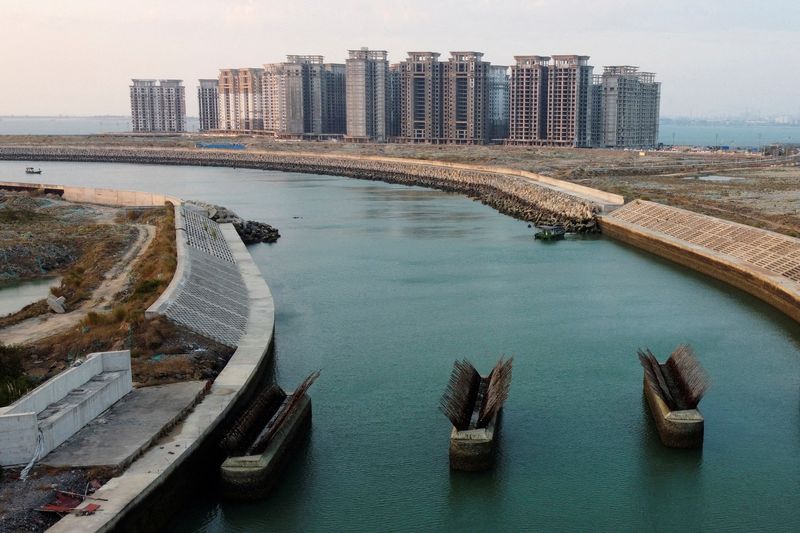
© Reuters. FILE PHOTO: An aerial view shows the 39 buildings developed by China Evergrande Group that authorities have issued demolition order on, on the man-made Ocean Flower Island in Danzhou, Hainan province, China January 6, 2022. Picture taken with a drone. REU
By Scott Murdoch
SYDNEY (Reuters) -Some offshore creditors of China Evergrande (HK:) Group are planning to join a winding-up court petition filed against the cash-strapped developer if it doesn’t submit a new debt revamp plan by next month, two sources familiar with the matter said.
Evergrande’s offshore debt restructuring plan, unveiled in March, has been thrown into uncertainty after the developer said on Sunday it was unable to issue new debt due to an ongoing regulatory investigation into its main unit in China.
Deepening turmoil in China’s debt-laden property sector is threatening to undermine Beijing’s efforts to get the sputtering economy back on more solid footing, and raising fears among investors of a systemic spillover into the country’s banking system.
Evergrande has been in the process of seeking creditors’ approval for its proposals to restructure offshore debt worth $31.7 billion, which includes bonds, collateral, and repurchase obligations.
Under the plan, Evergrande, the poster child of China’s property sector crisis, had proposed various options to offshore creditors, including swapping some of their debt holdings into new bonds with maturities of 10 to 12 years.
A group of Evergrande bondholders were surprised by the firm’s weekend announcement which said it was unable to issue new notes, and have been seeking meetings with the developer to seek more information, said the two sources.
If Evergrande fails to submit a new debt restructuring plan by Oct. 30, that bondholders’ group will support a winding-up petition already filed against the developer, said the sources, declining to be identified due to the sensitivity of the matter.
The number of creditors who are considering the move and the size of their holdings of Evergrande bonds were not known.
Top Shine Global, an investor in Evergrande unit Fangchebao, in June 2022 filed a winding-up petition in Hong Kong because it said the developer had not honoured an agreement to repurchase shares the investor bought in the unit.
In July, the hearing for that winding-up petition against Evergrande was adjourned to Oct. 30, in order to wait for the result from the developer’s meeting with creditors to vote on its debt restructuring plan.
Evergrande needs approval from more than 75% of the holders of each debt class to approve the plan.
That meeting is scheduled for mid-October. However, the latest disclosure by Evergrande puts the meeting, as well as its outcome, in doubt and it’s not clear if the meeting with offshore creditors will go ahead as planned.
Evergrande did not immediately respond to Reuters request for comment.
MISSED PAYMENT
The winding-up petition against Evergrande is one of the many such proceedings launched against Chinese developers as the firms failed to meet debt payment obligations after an unprecedented liquidity crunch hit the sector in 2021.
The liquidity crunch was triggered in part by government efforts to clamp down on high debt levels in the property sector and rein in speculation.
Many of the defaulted developers have been scrambling to get their offshore creditors’ approval for debt restructuring plans to avoid collapse or being forced into liquidation proceedings.
Shares in Evergrande ended down 8.1% on Tuesday at their lowest level since Sept. 6, extending losses for the second consecutive day, after its main domestic unit said it missed an onshore bond repayment.
The unit, Hengda Real Estate Group, said in a Shenzhen stock exchange filing late on Monday that it had failed to pay the principal and interest for a 4 billion yuan ($547 million) bond due by Sept. 25.
Evergrande’s stock plunged 22% on Monday, after its Sunday announcement about its inability to issue new notes.
The latest developments further darken the outlook for Evergrande, which has lurched from one crisis to another since its financial woes became public in 2021 and it defaulted on its offshore debt obligations later that year.
These setbacks also come as the Chinese authorities have been trying to revive homebuyers’ sentiment with a raft of easing measures, including a reduction in existing mortgage rates.








